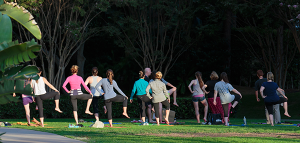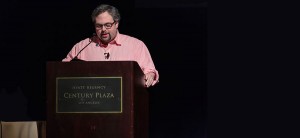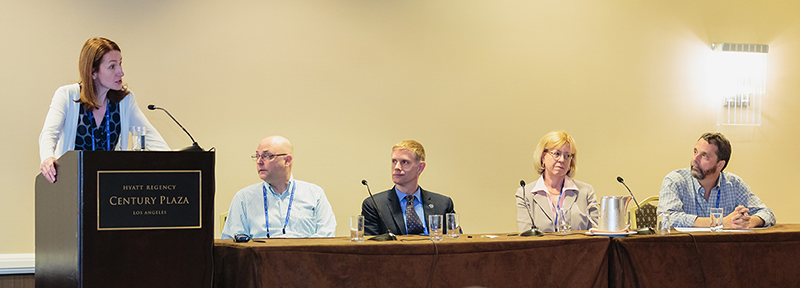We are now accepting proposals for presentations, evening events, support groups, the Keynote Address, and research posters for our 22nd Annual OCD Conference to be held in Boston, MA, on July 30 – August 2, 2015.
Our speakers and support group leaders are the backbone of our Conference. Help us make this year’s Conference our best yet by adding your insight, knowledge, and experience to our program. Whether you are a professional, or someone who wants to share their own personal stories of living with OCD, we invite you to submit your proposal to speak at the next Annual OCD Conference.
Presentation Proposals
We are accepting proposals for presentations to be presented during the 3 days of our Annual OCD Conference (Friday, 7/30 thru Sunday, 8/2). We accept proposals for presentations in the following “tracks”: General Audience, Individuals with OCD, Families/Parents, Kids with OCD, Teens with OCD, Young Adults with OCD, Researchers, Therapists, Hoarding Disorder, and Spanish-Language (conducted en Español). For tips on choosing the right topic, and maximizing your chance of being selected, click here.
NEW this year, we are looking to broaden the types and varieties of presentations that are given. You will see the following new options in the presentation proposal submission system this year:
- Talk/Lecture: These proposals typically have 1-4 presenters. A talk is usually a personal story given by an individual(s) who has struggled with OCD and/or related disorders, or been affected by OCD and/or a related disorder in some way (for example, a parent or spouse). A lecture is a presentation that emphasizes teaching attendees something new in a relatively structured manner. Lectures typically involve a PowerPoint presentation.
- Panel Discussion: Panels are proposals that typically include 3-4 presenters. The format of these presentations can be primarily Q&A and/or each panelist sharing their unique expertise on a topic. Panel discussions usually do not include a formal and structured PowerPoint presentation.
- Interactive Workshop: Interactive workshop proposals typically range from 1-4 presenters. The intent of these workshops is to engage the attendees through experiential exercises, completing and discussing worksheets, and/or role play demonstrations (or videotapes).
- Research Symposium: These proposals should be considered “advanced” and for the Researcher Track. They should include 1 moderator and/or discussant(s) and 3-4 research studies to be reviewed. That said, the symposium should have a clear theme and the abstract should demonstrate how the 3-4 research projects are related to each other.
Evening Activity Proposals
 We accept proposals for activities and special events that will take place in the evenings during the Conference, after the workshops and sessions have ended for the day. These can be social or networking activities, or experiential, or anything in between. Examples of past evening activities include:
We accept proposals for activities and special events that will take place in the evenings during the Conference, after the workshops and sessions have ended for the day. These can be social or networking activities, or experiential, or anything in between. Examples of past evening activities include:
- Ice Breaker events for adults, such as OCD Pub Trivia, 5-Mile Evening Run, Yoga for OCD, or Second City’s Improv for Anxiety.
- Fun, family-friendly events such as Ping Pong 4 OCD; Fashion Show & Karaoke for Kids, Teens, and Parents; and OCD Storytelling.
- Experiential events such as the popular Virtual Camping for Adults with Dr. Jon Grayson.
There is no specific time limit for these activities and special events — if your proposal is selected, we will work with you to design a program that best fits our schedule, as well as the schedule of your activity.
Support Group Proposals
We accept proposals for support groups that take place in the evenings of the Conference on Thursday, 7/29, Friday, 7/30, and Saturday, 8/1. Evening support groups can be either 60 or 90 minutes in length. We accept support group proposals for nearly everyone in the OCD community, including: Adults, Kids & Teens, and Young Adults with OCD or related disorders (such as Hoarding Disorder, BDD, and PANS/PANDAS) as well as their family members, caregivers, and supporters.
Keynote Address Proposals
 If you would like to be the Keynote Speaker at this year’s conference, we now have a separate proposal system for this presentation. The Keynote Address takes place during the Conference’s General Session on the morning of Saturday, August from 8:00-9:30am. Keynote Speakers are usually local to the area of the Conference, and have a compelling story to tell about their personal journey with OCD. Keynote Speakers must feel comfortable talking in front of a crowd of at least 800 people — speakers with a strong background in public speaking or presenting are preferred. You can view last year’s keynote address from Ethan Smith here.
If you would like to be the Keynote Speaker at this year’s conference, we now have a separate proposal system for this presentation. The Keynote Address takes place during the Conference’s General Session on the morning of Saturday, August from 8:00-9:30am. Keynote Speakers are usually local to the area of the Conference, and have a compelling story to tell about their personal journey with OCD. Keynote Speakers must feel comfortable talking in front of a crowd of at least 800 people — speakers with a strong background in public speaking or presenting are preferred. You can view last year’s keynote address from Ethan Smith here.
Submitting a Research Poster
We will be accepting proposals for research posters to be presented at our Researcher Meet & Greet (formerly called the Research Poster Q&A Session) at 5:30pm on the evening of Saturday 8/1, after the workshops have ended for the day. For the eighth straight year, the entire Conference community is invited to attend this cornerstone event to learn more about the latest research being done about OCD and related disorders. Travel awards and Conference scholarships are also available for student/trainee presenters.
For more information about speaking at the 22nd Annual OCD Conference, including suggested topics and tips for submitting your proposal, please visit: www.ocd2015.org/submit.


Hi,
I suffered from Pure Obsessional OCD for years. I kept getting misdiagnosed and told oh there’s nothing “wrong” with me. Ironically the day I found out I had lost my baby I was pregnant with I saw a new doctor who was able to correctly diagnose me and form an intense treatment plan. This is my darkest secret and I’m still hiding it from most people. I would love the opportunity to share my story snd finally unlock my “secrets” EMILY
I have been treated very successfully with ERP I will like to help.
Hi
I’m a business consultant and lecturer by profession from Sri Lanka. I have been experiencing OCD from my teenage. Here in Sri Lanka, there’s extremely limited awareness regarding OCD and it’s treated as social stigma and taboo. I’m wondering whether there’s any way that I contribute to your exercise by my knowledge and experience. Should you find my interest useful, be kind enough to respond by mail. Thank you.
We are trying to get a understanding for who and how to apply for a grant.